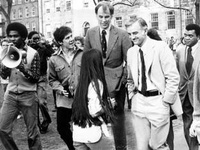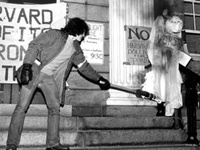Students with outside knowledge of South Africa helped the group raise awareness of the issue.
“I was South African and Neva [Seidman Makgetla ’78, co-founder of the SASC] had spent time in Southern Africa,” says SASC Co-Founder Cindy Ruskin ’79.
The movement on Harvard’s campus began in earnest on Nov. 2, 1977, when the SASC passed a proposal urging the Corporation to sell all Harvard’s stock in commercial banks that extended loans to the South African government. The proposal also suggested stockholders’ resolutions that would call for companies to curb operations in South Africa.
The proposal was channeled through ACSR, which was charged with making a recommendation to the Corporation as to the action it should take on its investments in South Africa.
As ACSR formulated its official statement to the Corporation, SASC rallied other student groups, House committees and even some faculty members around the cause.
Ruskin remembers a great rise in common consciousness surrounding the divestment question.
“The issue ended up being very important,” says Ruskin. “It really did polarize the entire campus and it seemed like the whole campus was involved.”
The intensity of these student calls for divestiture pushed the ACSR—for the first time in its brief history—to hold a public forum to take comments on the University’s position on investments in multinational corporations with operations in South Africa.
As weeks became months and the ACSR still had not reached a conclusion, SASC members grew impatient and alleged that the ACSR was intentionally stalling so that the deadlines for proposing shareholder resolutions in many companies operating in South Africa would pass as they deliberated. The SASC also demanded that the committee open its deliberations to the public.
“The administrators were very slow to understand the issues,” writes Seidman Makgetla in an e-mail. “I still don’t understand why.”
As student demonstrators marched in the snow outside an ACSR meeting that March, the body finalized its report to the Corporation on Harvard’s investments in companies operating in South Africa.
The report advocated neither the divestiture of stock in all companies operating in South Africa nor the initiation of shareholder resolutions calling on those companies to withdraw their operations from the racially segregated nation.
But the ACSR report did advise the Corporation to establish strict criteria for American firms wishing to remain in South Africa and means for taking action against companies that failed to comply with the guidelines.
The ACSR also advised the Corporation to establish a policy of non-investment in banks that made any new loans to the South African government, purchased government bonds or refused to release information to Harvard on their current South African loans.
Advocates of divestment argued that the report did not go far enough, and the committee’s recommendations disappointed many observers who had attempted to persuade the ACSR to advocate more far reaching measures against the offending corporations.
Read more in News
Pataki: 'Yale is Going to Crush Harvard'














